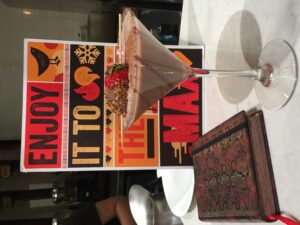 For me, New Year’s Eve usually involves blowing horns, laughing and acting silly, toasting with champagne, and stealing a kiss as the clock hits midnight on Dec. 31. I’ve also enjoyed many pleasant New Year’s Eves curled up on the sofa watching THE ball drop on Times Square.
For me, New Year’s Eve usually involves blowing horns, laughing and acting silly, toasting with champagne, and stealing a kiss as the clock hits midnight on Dec. 31. I’ve also enjoyed many pleasant New Year’s Eves curled up on the sofa watching THE ball drop on Times Square.
Most of us remember the panic of 2000, better known at Y2K. Included in all was singing the beloved, “Auld Lang Syne.”
What the heck do those words mean? I sing it year after year and haven’t thought much about its interpretation. After my good friend, Google did her magic, I find “Auld Lang Syne” was originally a Scottish poem written by Robert Burns in 1788 and later set to music. The phrase “auld lang syne” translates literally in English to “old long since” and means “times gone by,” or “for old time’s sake.”
The lyrics are asking if it is right to forget old times or old acquaintances? It is telling us to look back, remember, and give tribute to old friends. It tells us to take a cup of kindness for people and experiences held snug in memories.
I like that.
Christmas cards help me bring friends, past and present, to mind. When I address envelopes and sign cards, I smile with memories of great times with special people. Creating, preparing, and sending cards with short notes is one of my favorite holiday traditions, and it certainly involves “auld lang syne.”
One week after Christmas we celebrate New Year’s Eve. It is a ritual of saying goodbye to the current year while welcoming the hope of new beginnings.
I’m not sure anything is more relevant at the end of this crazy year than a reminder for calm reflections and perspective. As they emigrated around the world, the Scottish, English, and Irish brought along “Auld Lang Syne” for our enjoyment. Maybe they too used the lyrics with the tradition of singing and toasting out the old and welcoming the new to improve their mental health. Imagine the historical challenges and heartaches of the 1700s inspiring people to remember, forgive, and celebrate.
Good mental health involves letting go, looking forward, remembering good friends, and feeling grateful for lessons learned. Maybe “auld lang syne,” says it simply. Life happens, and there are many tears between then and now, but “For auld lang syne, my dear, for auld lang syne, we’ll take a cup of kindness yet, for auld lang syne.”
Join me tomorrow night in singing with gusto: “Should auld acquaintance be forgot, and never brought to mind? Should auld acquaintance be forgot, and auld lang syne?”
P.S. I think the answer is “No.” Remember the lessons, the laughs, and the love.
Until the next time: Live while you live.
Powered by WPeMatico